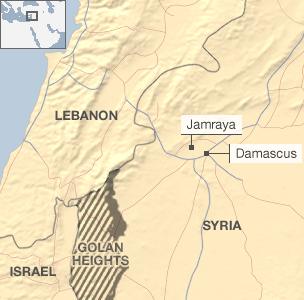White House warns Syria over 'weapons to Hezbollah'
- Published
There are differing accounts about what the reportedly Israeli strike was targeting
The White House has warned Syria not to transfer weapons to Hezbollah in neighbouring Lebanon.
The warning came amid contradictory claims of an Israeli strike in Syria.
Syria says Israeli war planes bombed a military research centre north-west of Damascus, but the US and others say lorries carrying weapons bound for Lebanon were hit.
Israel has maintained silence about the incident, but Syria has made a formal complaint to the UN.
Damascus says it reserves the right to defend itself, while its allies Russia and Iran have strongly denounced the attack.

The Syrian army statement about the incident, carried on state media, said Israeli fighter jets had carried out a direct strike on a scientific research centre in Jamraya, killing two people and wounding five.
But a US official told the BBC the target was a convoy carrying SA-17 surface-to-air missiles. Some rebel groups have said they targeted the Jamraya centre.
Israel has declined to comment.
The latest developments have struck a country in turmoil. Syrian President Bashar al-Assad continues to cling to power despite a 22-month conflict that has killed more than 60,000 people.
Syria protest
White House deputy national security adviser Ben Rhodes did not confirm details of Israel's raid itself, but had a warning to issue to Syria.
"Syria should not further destabilise the region by transferring weaponry to Hezbollah," he said.
News of the attack does not appear to have generated much alarm in Washington, says the BBC's Paul Adams.
Indeed, he says, the presence in Washington of Israel's military intelligence chief suggests the Obama administration may have been told about the raid beforehand.
But Syria's foreign ministry summoned the UN commander in the Golan to deliver a formal protest, saying Israel's action violated the 1974 disengagement agreement between the two sides, who remain technically at war.
A UN observer force, external has been in place in the Golan since 1974, with the task of providing "an area of separation and for two equal zones of limited forces and armaments on both sides of the area".
"Syria holds Israel and those who are protecting it at the Security Council responsible for the results of the attack and confirms its right to defend its land and sovereignty," Syria said in a letter to the UN, reported by state media.
But Syria itself is hardly in a position to do much, says the BBC's Jim Muir in Beirut.
'Unprovoked attacks'
Both Hezbollah and Iran are also under pressure at the moment, and Israel's calculation must be that none of those hostile parties has an interest in triggering a regional conflagration right now, our correspondent says.
Later, the UN Secretary General Ban Ki-moon expressed "grave concern" over reports of Israel's action, and called on all concerned to respect international law.
Syria's allies denounced Israel's action, while Iranian Foreign Minister Ali Akbar Salehi condemned the alleged air strike as an "overt assault based on the West's policy" to undermine stability in Syria.
Russia - a stalwart defender of Syria on the international diplomatic scene despite its warming trade and economic ties with Israel - also took a strong stance.
"If this information is confirmed," said the foreign ministry, "then we are dealing with unprovoked attacks on targets on the territory of a sovereign country, which blatantly violates the UN Charter and is unacceptable, no matter the motives to justify it."
Earlier Syria's ambassador to Lebanon warned Damascus could take a "surprise" decision to retaliate.
US Vice-President Joe Biden is travelling to Germany, where he is expected to discuss the situation in Syria with Russian Foreign Minister Sergei Lavrov and the Syrian opposition leader, Moaz al-Khatib.
Weapons facility
The Syrian army statement said the Jamraya centre - which was focused on "raising our level of resistance and self-defence" - was damaged in the attack, and specifically denied reports that an arms convoy had been hit.
It said "armed terrorist gangs" - a term the government uses to describe rebel groups - had tried and failed repeatedly to capture the same facility in recent months.
But an opposition activist told the Washington Post, external that, although there had been two attacks on the centre early on Wednesday, "we did not hear any airplanes... Unless the airplanes were silenced by some technology."
"I mean, is it possible for an air fighter to attack at night, and we don't even hear its sound?"
Some reports suggest the facility could be Syria's Scientific Studies and Research Centre, known by its French acronym CERS, believed to be the state organisation responsible for developing biological and chemical weapons.
Lebanese military and internal security forces say there has been increased activity by Israeli warplanes over Lebanon in the past week, and particularly on Tuesday and the early hours of Wednesday morning.
There is increasing concern in Israel that Syria's chemical weapons could fall into Hezbollah's hands.
Correspondents say Israel is also concerned the Shia militant group could obtain anti-tank and anti-aircraft missiles, thus strengthening its ability to respond to Israeli air strikes.
Israel believes Syria received a battery of SA-17s from Russia after an alleged Israeli air strike in 2007 that destroyed a Syrian nuclear reactor near Deir Ezzor in eastern Syria, analysts say.
Wednesday's reported attack came days after Israel moved its Iron Dome defence system to the north of the country.